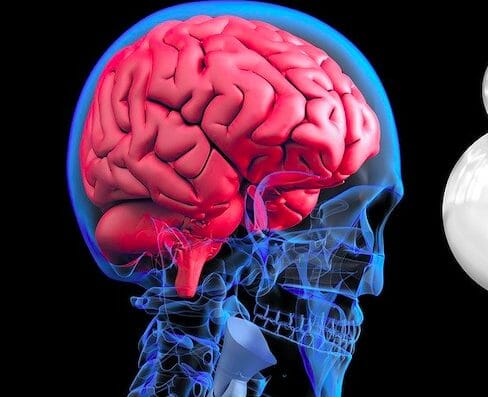Jessica Langbaum at the Banner Alzheimer’s Institute discusses the role of genetics in Alzheimer's and whether people should seek genetic testing for the disease.
Certain genes like ApoE that play an important role in the disease. ApoE’s genetic variant, known as ApoE4, is the strongest genetic risk factor for developing Alzheimer’s in later life. Genetic tests by mail, like 23andMe and AncestryDNA, make it easy to learn about one’s ApoE status — and to learn that one may have a much higher likelihood of developing Alzheimer’s in their lifetime. But just because a person carries the ApoE4 variant doesn’t mean that their fate is sealed: Alzheimer’s is a complicated disease, and genetics is one among many factors, from lifestyle and environmental factors to preexisting health conditions, that influence people’s risk.
Being Patient sat down with Jessica Langbaum, co-director of the Alzheimer’s Prevention Initiative at the Banner Alzheimer’s Institute, to discuss the complex role of genetics in Alzheimer’s, asking: Should people seek genetic testing for Alzheimer’s? And if they do, how can they ensure they are prepared for what they find?’
1. Understanding ApoE and Risk of Late-Onset Alzheimer’s
ApoE is most commonly linked with late-onset Alzheimer’s, a form of the disease which usually occurs in people over the age of 65 and accounts for the majority of Alzheimer’s cases. The gene comes in three common forms, or alleles: E2, E3 and E4. Everyone inherits an ApoE gene from each biological parent, and there are six possible ApoE combinations: E2/E2, E2/E3, E2/E4, E3/E3, E3/E4, E4/E4.
Analyzing data from past research of individuals who are cognitively healthy, Langbaum and colleagues found in a study that people who carry two copies of ApoE4 have a 30 to 55 percent risk of developing mild cognitive impairment or Alzheimer’s by the age of 85. The study also shows a 20 to 25 percent risk for people with one copy of the genetic variant. People with two copies of ApoE3 have an estimated risk of 10 to 15 percent. The researchers had less information available about people with ApoE2 as it’s rare, estimating that its associated risk with Alzheimer’s may be slightly lower or higher than 10 to 15 percent by the age of 85.
2. Experts Currently Recommend Against ApoE Genetic Testing in Medical Care
According to Langbaum, the Banner Alzheimer’s Institute generally does not recommend people seek ApoE genetic testing in medical care at this time (it cannot make a recommendation for a direct-to-consumer test like 23andMe). For one, she said there are currently no FDA-approved therapies that target people with a genetic disposition to Alzheimer’s.
Langbaum also noted that Alzheimer’s can afflict people with or without ApoE4. “These are not foolproof tests that tell somebody with 100 percent certainty whether you will or won’t develop the disease,” she said of genetic tests for ApoE status.
She added, “There [are] lots of other things in addition to genetics that influence a person’s risk.” While age is the greatest non-genetic risk factor, other variables include family history, gender, education and health conditions like diabetes and high blood pressure. People’s lifestyle such as diet, sleep, exercise and social interaction also influence their risk for developing Alzheimer’s. Regardless of people’s ApoE status, Langbaum noted that everyone should be living a healthy lifestyle to the best of their ability.
However, there are people who are curious to learn more about their risks for developing Alzheimer’s, and researchers are now studying how people respond to the disclosure of their ApoE status. In a yet-to-be published study, Langbaum and colleagues have found that with genetic counselling, psychologically healthy people who wish to know their genetic information can process their ApoE status, without experiencing long-term effects to their wellbeing.
“Learning your ApoE results with proper genetic counseling is safe and well-tolerated,” Langbaum said. “We’ll see a little increase in anxiety and feelings of stress. After the counseling, that usually dissipates and goes back to normal within six to 12 weeks after the session.”
3. Scientists Have Identified Genetic Mutations That Cause Early-Onset Alzheimer’s
While researchers have found genetic risk factors for late-onset Alzheimer’s, they have, on the other hand, identified rare genetic mutations that cause early-onset Alzheimer’s, which affects people younger than the age of 65.
Langbaum said people who carry hereditary genetic mutations in one of three genes – PSEN1, PSEN2 and APP – nearly always develop the disease. They account for less than 1 percent of all people with Alzheimer’s.
She noted that the decision to order genetic testing for a genetic mutation that causes early-onset Alzheimer’s is typically made between the patient, clinician and in many cases, family members.
Meanwhile, there seems to be certain genetic factors that may be protective against Alzheimer’s. Scientists from the Banner Alzheimer’s Institute and colleagues found that an extremely rare variant of ApoE, known as the Christchurch mutation, appeared to protect a Colombian woman from the ravages of the disease.
The woman, who carried the PSEN1 mutation and two copies of the Christchurch mutation, had normal cognitive abilities until her 70s when she began to develop memory decline. Even though she had high levels of beta-amyloid plaques in her brain, there were very limited atrophy and tau pathology.
While researchers are trying to better understand the biological mechanisms involved in the Christchurch mutation and Alzheimer’s, Langbaum said others are studying how genetics play a role in early-onset Alzheimer’s that isn’t caused by genetic mutations in PSEN1, PSEN2, and APP, delving into genetic factors beyond rare variants and ApoE.
For more guidance on this topic subscribe to our newsletter to be the first to know about upcoming live talks with experts on practical topics related to Alzheimer’s, dementia and caregiving.
Contact Nicholas Chan at nicholas@beingpatient.com





My grandmother Mary Grey have vascular dementia. My Nana Mary Grey have died 3th May 2020 age 78 year old sleep Norfolk & Norwich university hospital have dementia
My mother died with Alzheimers 3 years ago. This has prompted my curiosity as to whether I may carry the gene. I am 74 yrs old and in perfect health.